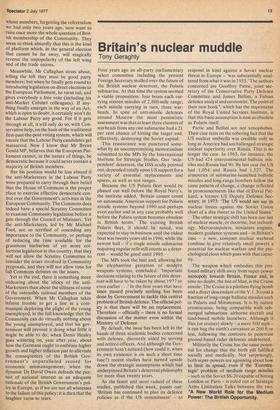Britain's nuclear muddle
Tony Geraghty
Four years ago an all-party parliamentary select committee including the present Foreign Secretary mulled over the future of the British nuclear deterrent, the Polaris submarine. At that time the system seemed a viable proposition: four boats each car- rying sixteen missiles of 2,880-mile range; each missile carrying in turn, three war- heads. In spite of anti-missile defences around Moscow the most pessimistic assessment was that at least three clusters of warheads from any one submarine had a 21 per cent chance of hitting the target and, effectively, destroying the Soviet capital.
This reassurance was punctured some- what by an uncompromising memorandum submitted to the MPs by the International Institute for Strategic Studies. Our 'inde- pendent' deterrent, the I ISS acidly pointed out,.depended totally upon US support for a variety of essential replacements and spares, as well as test ranges.
Because the US Polaris fleet would be phased out well before the Royal Navy's, the institute added, 'Britain cannot count on automatic American support for Polaris missile systems beyond 1980 and perhaps even earlier and in any case, probably well before the Polaris system becomes obsolete in British terms.' The existing British Polaris fleet, it should be noted, was expected to stay in business until the oldest boat was twenty years old in 1986, while the newest hull — if a single missile submarine requiring regular refit still counts as a deter- rent — would be good until 1995.
The MPs took the hint and, allowing for the elephantine gestation of modern weapons systems, concluded: 'Important decisions relating to the future of this deter- rent will have to he taken by about 1977 or even earlier . . In the four years that have since passed precisely nothing has been done by Government to tackle this central problem of British defence. The official pol- icy is that there will be no replacement. Therefore — officially — there is no formal discussion of the matter even within thet Ministry of Defence.
By default, the issue has been left in the' hands of three academic bodies concerned with defence, discreetly aided by serving and retired officers. And although the Gov- ernment hasn't noticed (how could it, when its own existence is on such a short time fuse?) recent studies have turned upside down the strategic assumptions which had underpinned Britain's deterrent philosophy for more than twenty years.
As the latest and most radical of these studies, published this week, points out: 'Britain has continued to plan its defence policies as if the US commitment' — to respond in kind against a Soviet nuclear threat to Europe — 'was substantially unal- tered from what it was in 1955.' The authors concerned are Geoffrey Pattie,. joint sec- retary of the Conservative Party Defence Committee and James Bellini, a Fabian defence analyst and economist. The point of their new book*, which has the imprimatur of the Royal United Services Institute, is that this basic assumption is now as obsolete as Polaris itself.
Pattie and Bellini are not xenophobes. Their case rests on the sobering fact that the US nuclear umbrella was credible only so long as America had unchallenged strategic nuclear superiority over Russia. That is no longer the case. In 1963, for instance, the US had 424 intercontinental ballistic mis- siles and Russia had 90. By last year the US had 1,054 and Russia had 1,527.. The armouries of submarine-launched ballistic missiles and long-range bombers follow the same pattern of change, a change reflected in pronouncements like that of David Pac- kard, a former US Deputy Defence Sec- retary, in 1973: 'The US would not use its nuclear forces against the Soviet Union short of a dire threat to the United States.'
The other strategic shift has been one not of nuclear muscle, or doctrine, but technol- ogy. Microcomputers, miniature engines, modern guidance systems and — in Britain's case — a new, compact nuclear warhead combine to give relatively small powers a potential for nuclear warfare and the psy- chological clout which goes with that capac- ity.
The weapon which embodies this pro- found military shift away from super-power monopoly towards Britain, France and, in time no doubt, the Isle of Man, is the Cruise missile. The Cruise is a pilotless flying bomb and a direct descendant of the V-1. It costs a fraction of long-range ballistic missiles such as Polaris. and Minuteman. It is by nature promiscuous, being compatible .with sub- merged submarines. airborne aircraft and land-based mobile launchers. Although it flies (or cruises) slowly — a mere 500 mph it can hug the earth's curvature at 200 ft or less, following the contours to penetrate ground-based radar defences undetected.
Militarily the Cruise has the same poten- tial for change that the birth pill fulfilled socially and medically. Not surprisingly, both super-powers are agonising about how to limit its spread, even if the Turostra- tegic' problem of medium range missiles — such as the Soviet SS-20 capable of hitting London or Paris — is ruled out of Strategic Arms Limitation Talks between the two. *A New World Role for the Medium Power: The British Opportunity. Meanwhile, the proliferation of such inter- mediate range weapons, which would have the same effect on European capitals as would ICBMs on Moscow or Washington, continues unimpeded by the US and Russia.
France, which never had much faith in the US nuclear umbrella, seems certain to develop an independent Cruise missile soon. The nationalised British Aerospace Corporation has plans for such a weapon on the drawing board. But as Pattie and Bellini point out, drawings are not much of a deter- rent. 'Britain now faces a major challenge of strategic relevance,' they argue. 'Its nuclear strike force rapidly approaches obsoles- cence. It has made no investment in a suc- cessor . . . The acquisition of a Cruise mis- sile capability by either Britain or France would inevitably pose major problems for American diplomacy in future SALT negotiations with Moscow . . . Such a deci- sion by Britain is therefore likely to meet with deep hostility on the part of the United States . There will be financial pressures of potentially enormous consequence brought to bear on British governments who indicate their desire to build such weapons. If Britain is to maintain a credible defence posture . . . these are pressures that will have to be resisted.'
Fears of such pressure are not groundless. Last year during the controversy over Brit- ish support for an American-built airborne early warning system for Nato, Downing Street was advised that if such support were not forthcoming, then Britain could not count on the US in IMF measures to aid sterling. That tactic was abandoned only when President Carter succeeded President Ford. Although there is no sign that the present British government will ever • have to face a showdown over the Cruise missile. as a result of its policy of dynamic inactivity on a successor to Polaris, a future gov- ernment will certainly have to make up its mind.



































 Previous page
Previous page